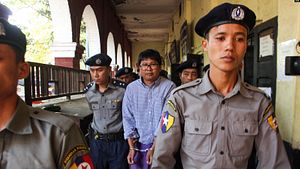May 3 is World Press Freedom Day, and this year’s is the first since the brutal killing of Saudi journalist Jamal Khashoggi. His murder was a tragic blow against the sanctity of a free press, but it was also a powerful rallying cry. Why would a lone brave columnist be so feared by one of the most powerful rulers in the world? International celebratory days can feel like gimmicks – that is, until a single moment reminds us of all that there is to protect.
The battle for a free press is being fought everywhere. One of its most perilous frontlines is here, in Southeast Asia. When TIME Magazine chose to herald journalists as its Person of the Year, it ran four alternate cover stories. Two were from Southeast Asia. One cover story depicted Reuters journalists (and now Pulitzer Prize laureates) Wa Lone and Kyaw Soe Oo, from Myanmar. Another cover honored the CEO and Executive Editor of Rappler, Maria Ressa, from the Philippines.
While their plights have become iconic, there is a risk of forgetting TIME’s broader message. These journalists’ stories are exceptional. The abuse and harassment they and their peers face are anything but.
Last week Myanmar’s highest court rejected Wa Lone and Kyaw Soe Oo’s appeal, upholding their seven-year prison sentences, despite overwhelming evidence that they were convicted on spurious charges, and in clear retaliation for investigating Myanmar military abuses against Rohingya people in northern Rakhine state.
The global outcry over the case hasn’t deterred Myanmar’s authorities from applying the same tactics against others. In recent weeks alone, a prominent filmmaker, five satirical performers, and an editor of The Irrawaddy, a well-known Myanmar news outlet, have all been charged in connection with their peaceful criticism of the military.
In the Philippines, the authorities’ harassment of Maria Ressa and Rappler grabs global headlines with every twist and turn of the staggering 11 lawsuits currently filed against them. Rappler’s fearless journalism has frequently exposed President Duterte’s so-called “war on drugs” for the brutal and murderous attack on the poor it really is, and the government appears desperate to crush independent journalism in its effort to change the narrative.
Last month brought more evidence of an aggressive campaign against independent media that is moving well beyond Rappler. On April 22, the government released a matrix naming journalists and lawyers supposedly working together to oust President Rodrigo Duterte, announcing a national police investigation into those named.
Drawing up lists of public targets is a common and sinister fear tactic of this administration. This is a particularly reckless escalation, knowing that people on such lists have been threatened, harassed, or worse – this adds further to the insecurity faced by journalists, in the Philippines and beyond.
Perhaps the most shocking case of recent months is that of Truong Duy Nhat, a Vietnamese journalist and weekly Radio Free Asia contributor. In late January, Nhat disappeared from a shopping mall in Bangkok, Thailand, in an apparent abduction. A former prisoner of conscience who feared he was becoming a renewed target of the Vietnamese authorities, he had fled Vietnam weeks earlier and filed for asylum with the UN Refugee Agency in Bangkok, the day before he disappeared. Weeks later, Nhat resurfaced in a prison cell in Vietnam. His friends and family have not been allowed contact with him.
Putting aside the exception of the antiquated British colonial-era Official Secrets Act used to jail Wa Lone and Kyaw Soe Oo in Myanmar, the trend in the region is to use criminal defamation laws – honed for the digital age – to pursue and punish journalists. These laws, bolstered by sophisticated surveillance techniques, represent a new strategy for governments to crackdown on freedom of expression.
Maria Ressa faces charges for “cyber libel” under the Cybercrime Prevention Act. In the last year alone, Vietnam and Thailand have enacted, and Cambodia has drafted, chillingly invasive cybersecurity laws that afford the authorities sweeping powers. Singapore is poised to enact a deeply flawed Online Falsehoods Bill against “fake news.” Singapore’s law very vaguely defines fake news and makes the government the sole arbiter of what is “false” or “misleading.” The law does nothing to separate malicious misinformation from legitimate exceptions, like satire, or even people mistakenly posting false content they believe is true.
Worryingly, Singapore, which is hosting Facebook’s first data center in Asia in a billion-dollar investment, looks set to further entrench its position as a digital hub in the region. There is a danger that the Singapore authorities will attempt to make Facebook subject to local laws in violation of the fundamental right to freedom of expression. Unless the draft law is amended to comply with those international standards, it risks setting an alarming precedent for the region.
Bracing against this swelling tide of government-designed repression are hundreds more Wa Lones and Kyaw Soe Oos, Maria Ressas and Truong Duy Nhats. Each day, they take incredible risks to expose abuse, putting themselves and their loved ones in danger every time they enter the newsroom, take to their keyboard, or use their smartphone.
In its heroes and its challenges, Southeast Asia’s journalists are writing the next chapter in the struggle for press freedom. We have never needed them more.
Ming Yu Hah is Regional Campaigns Director for Southeast Asia & the Pacific at Amnesty International.

































